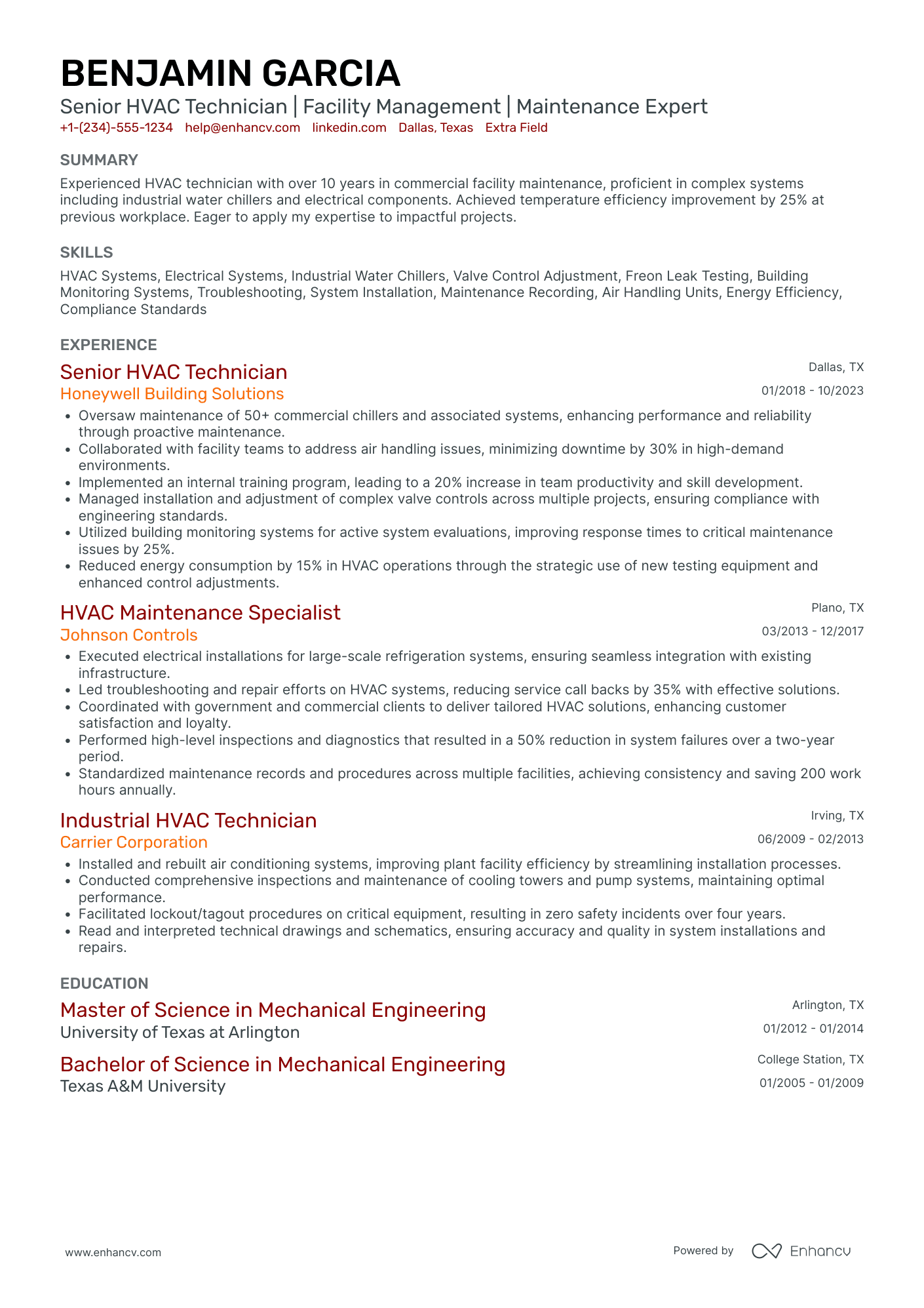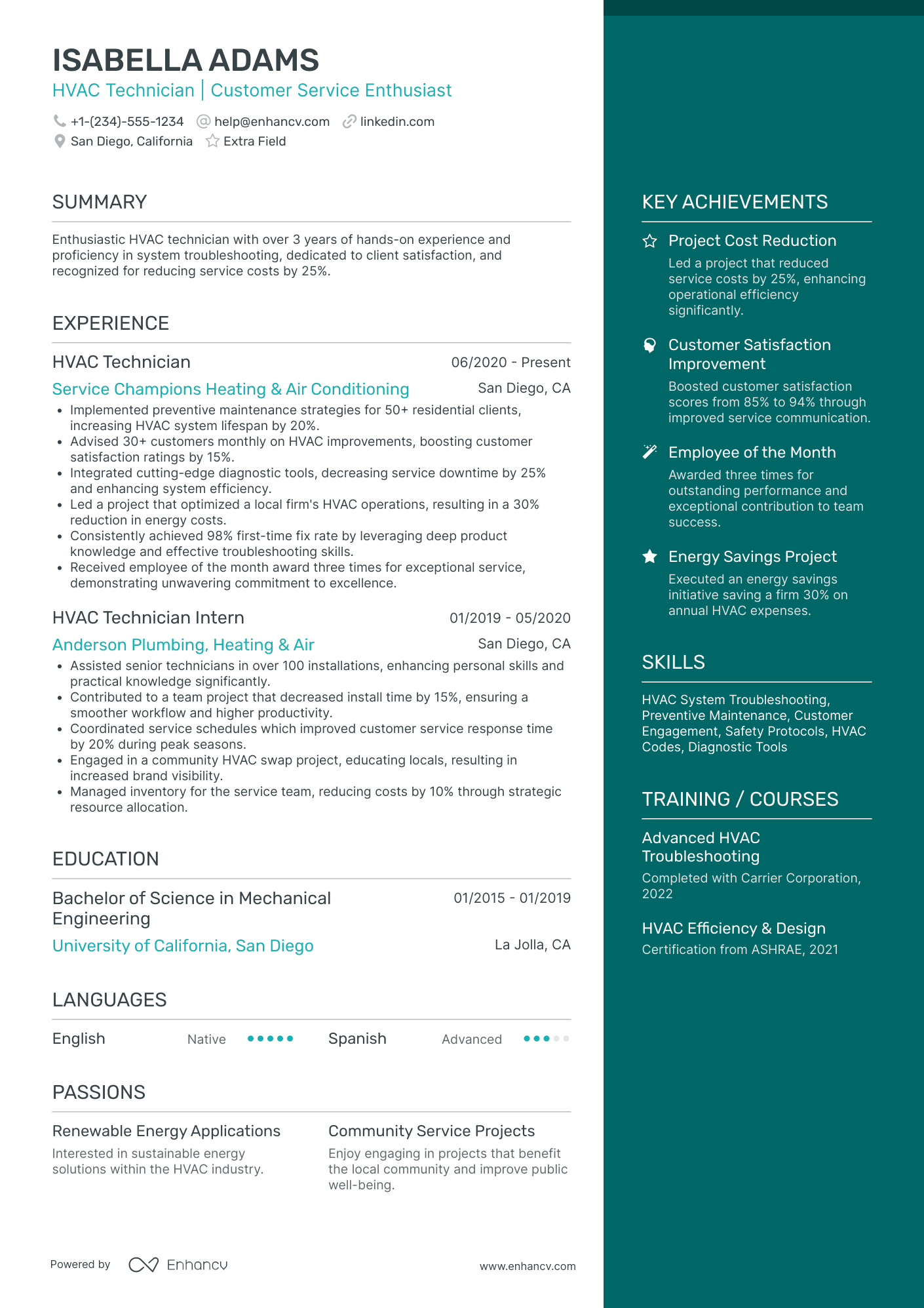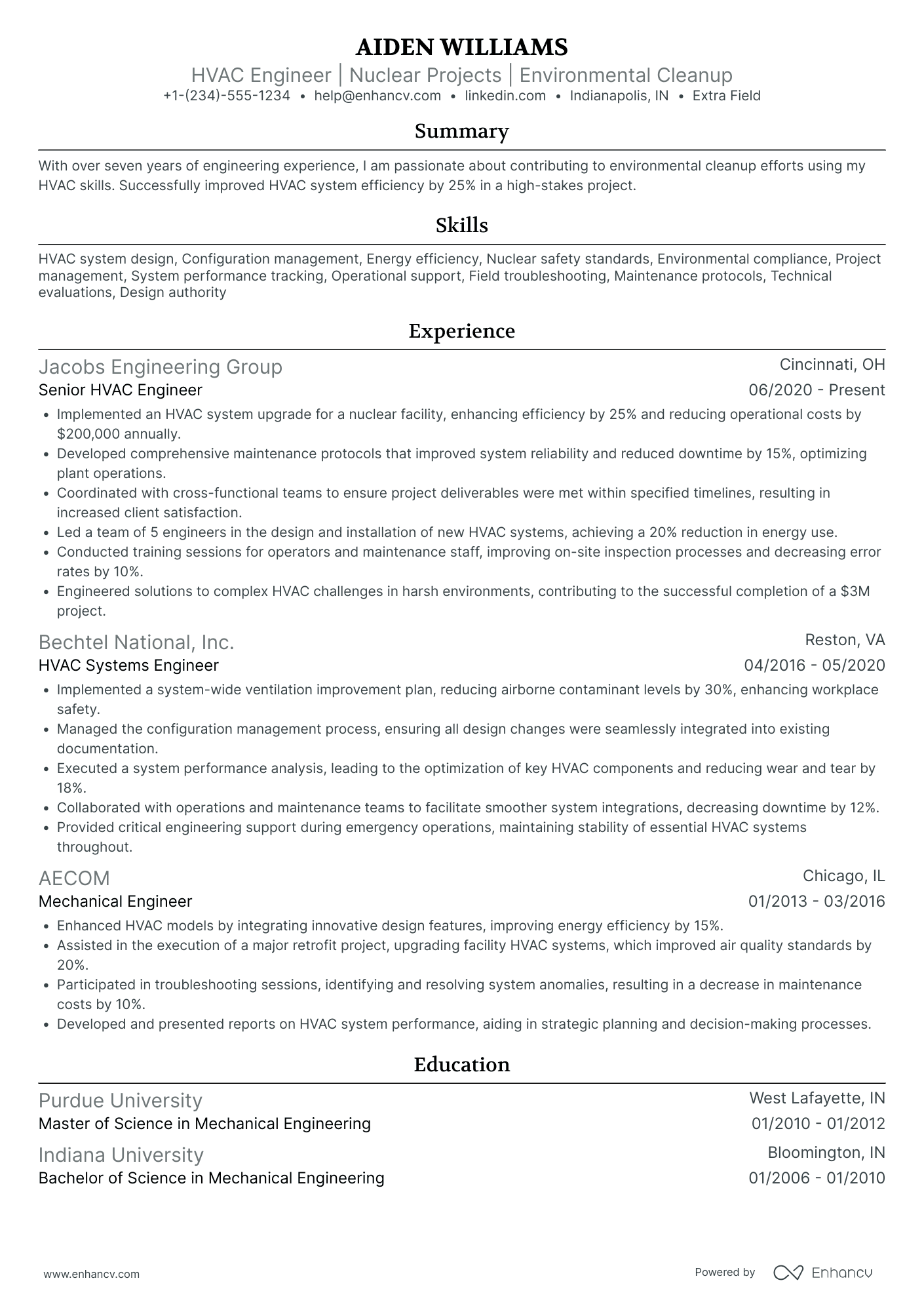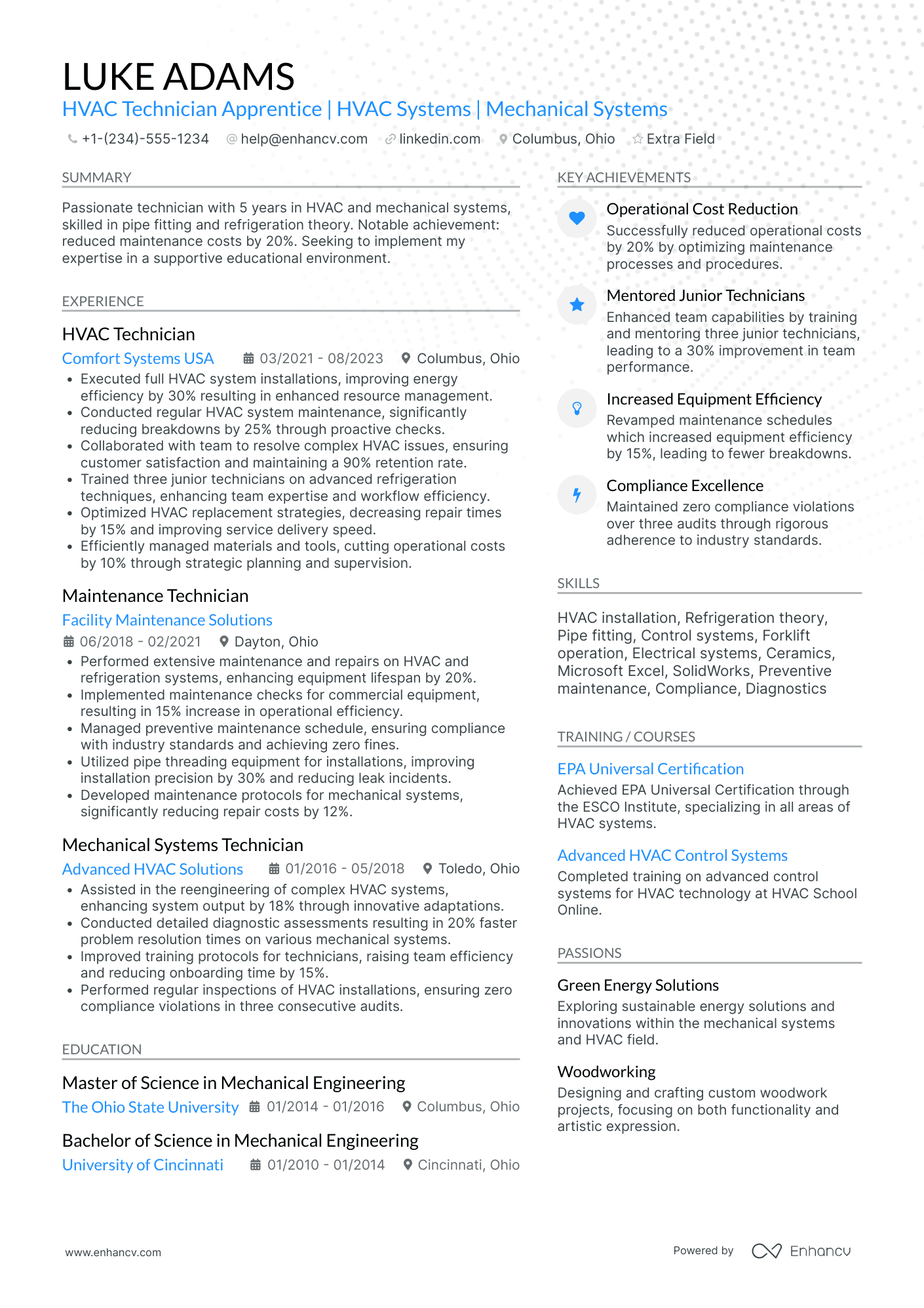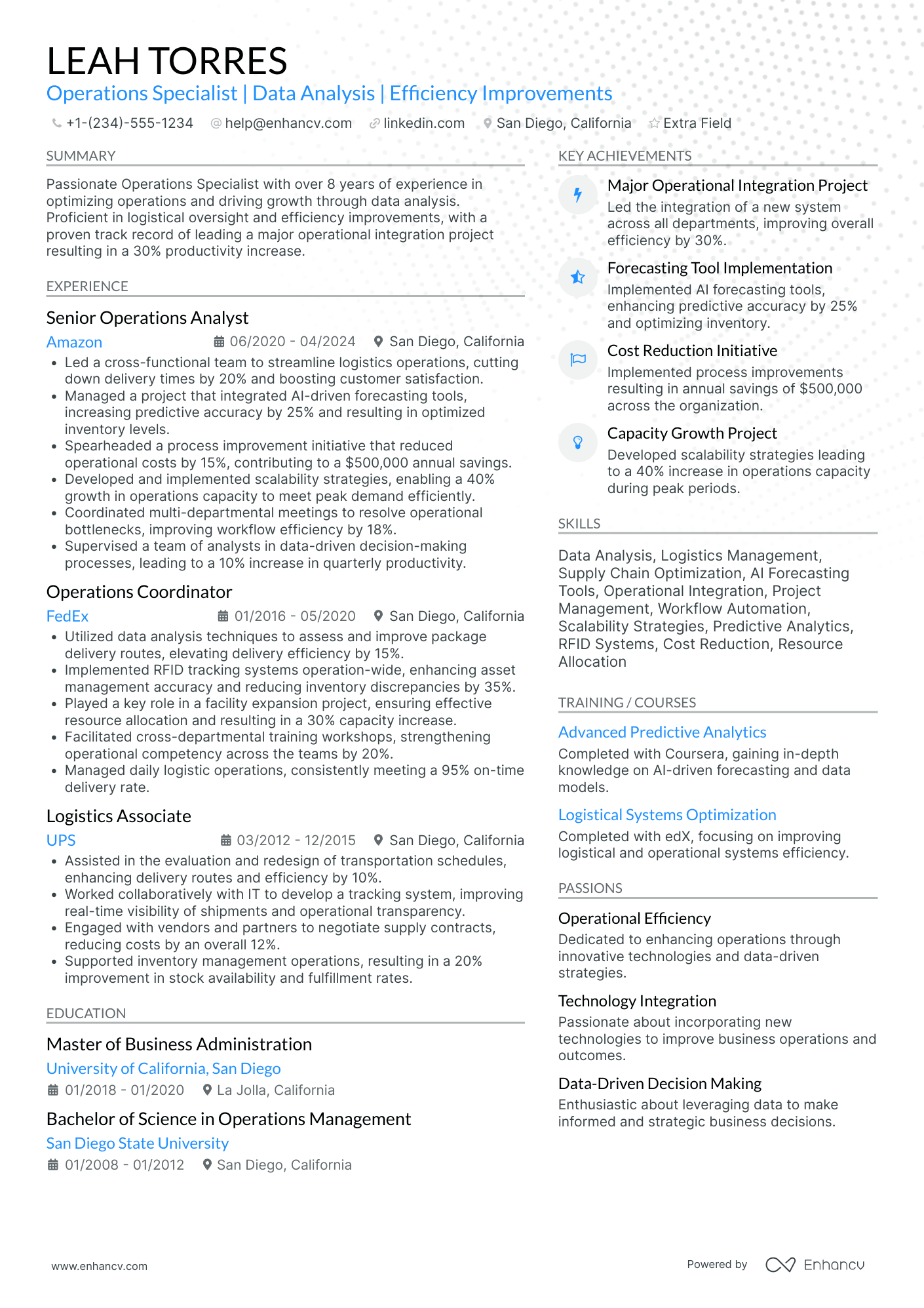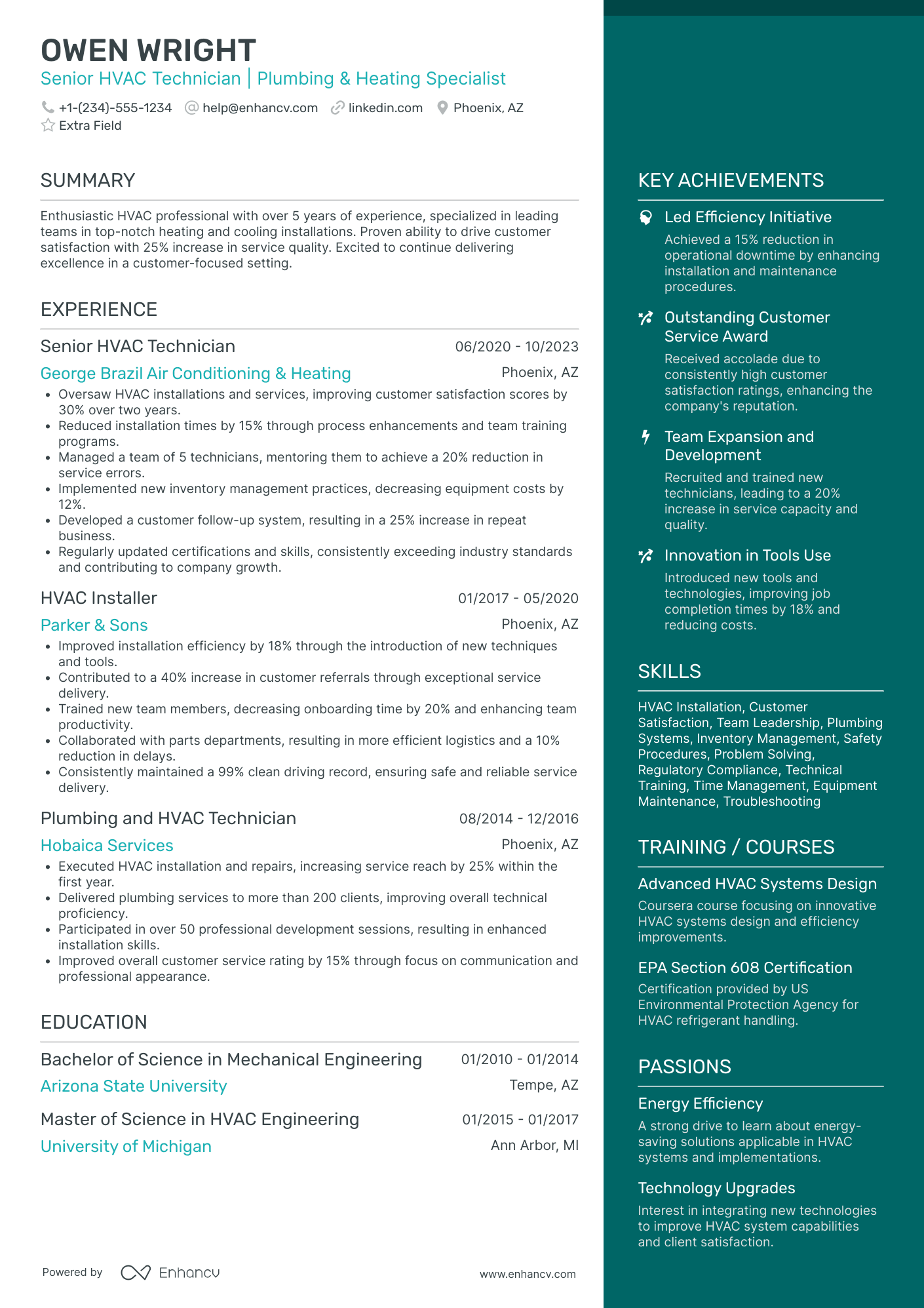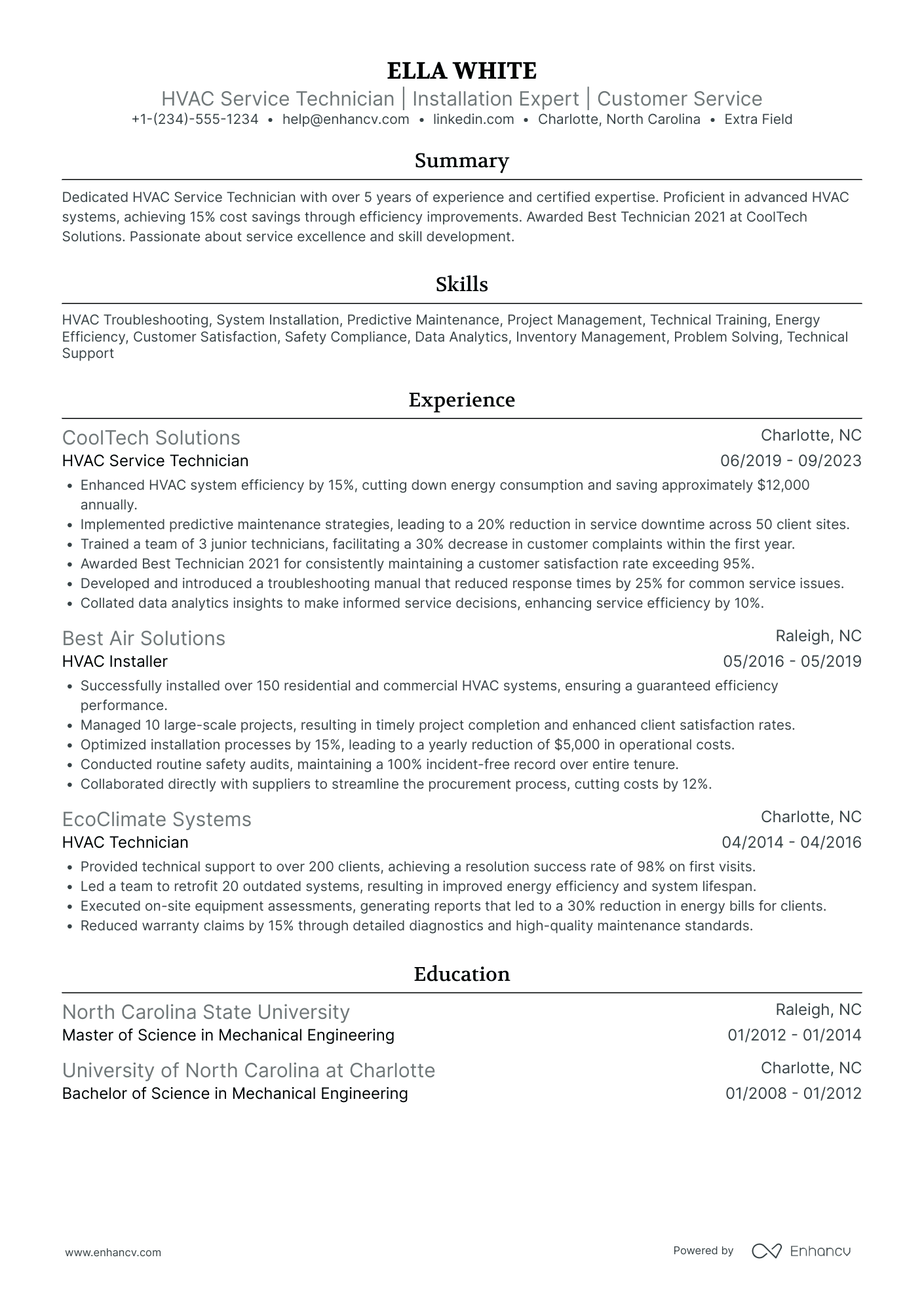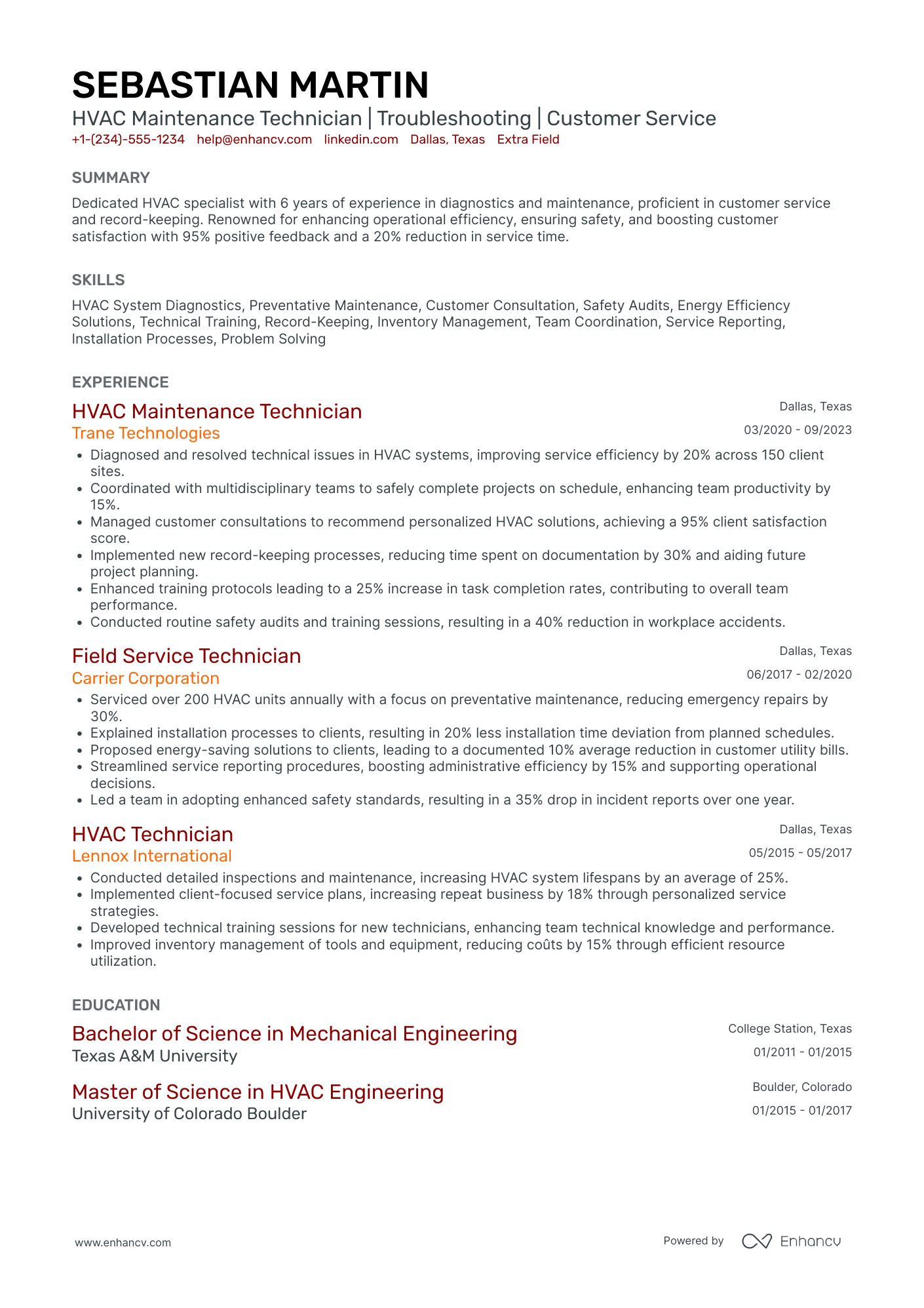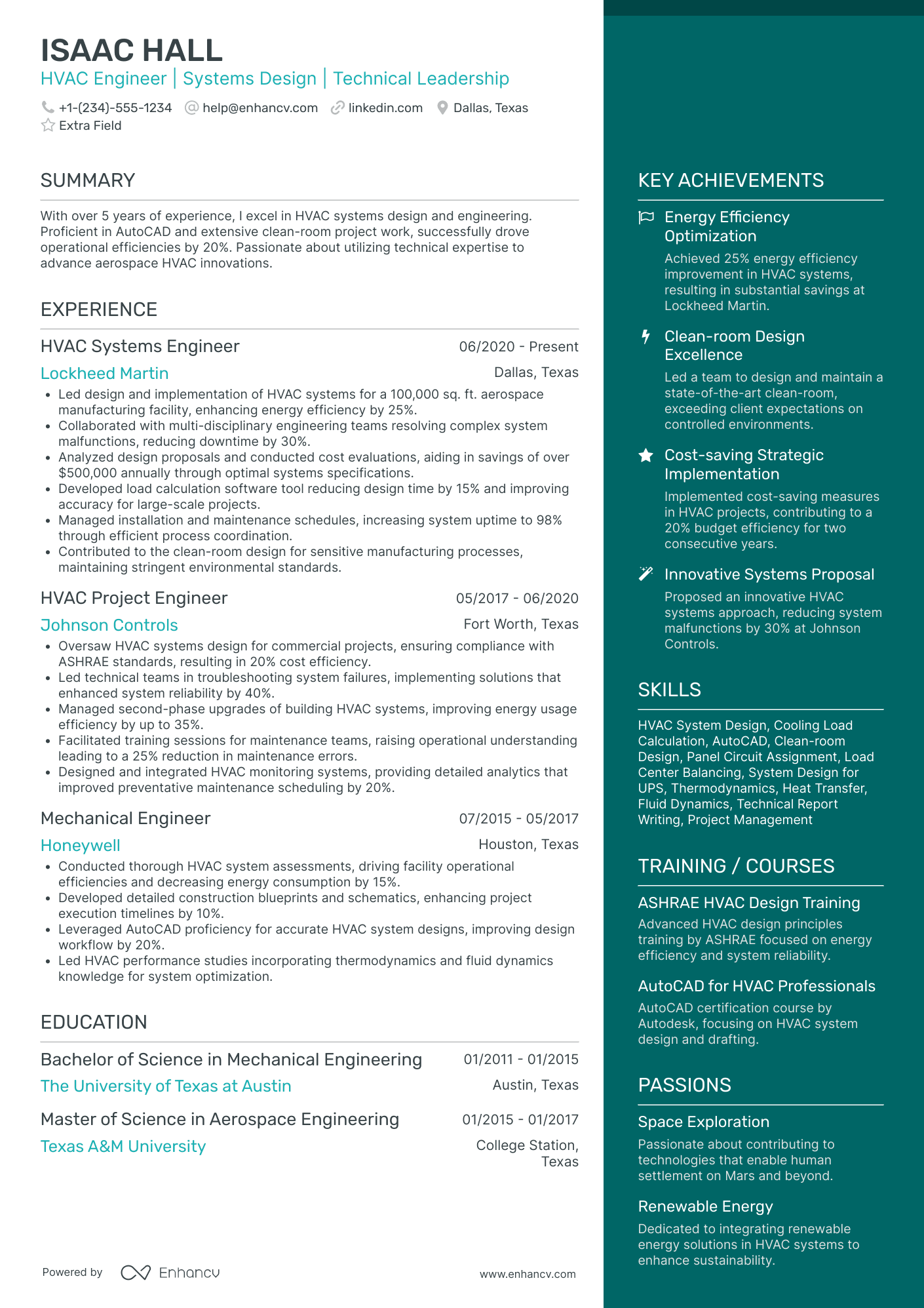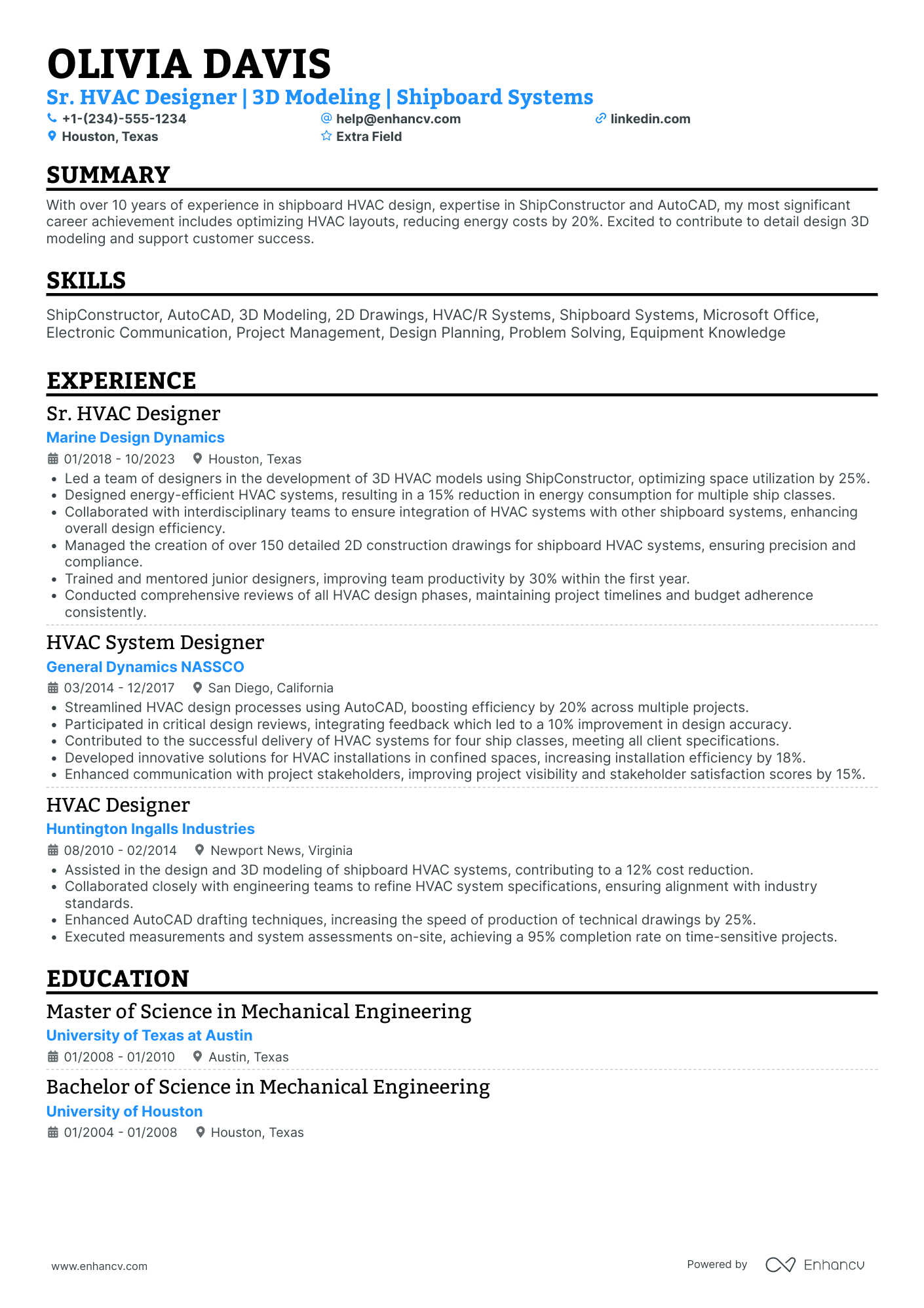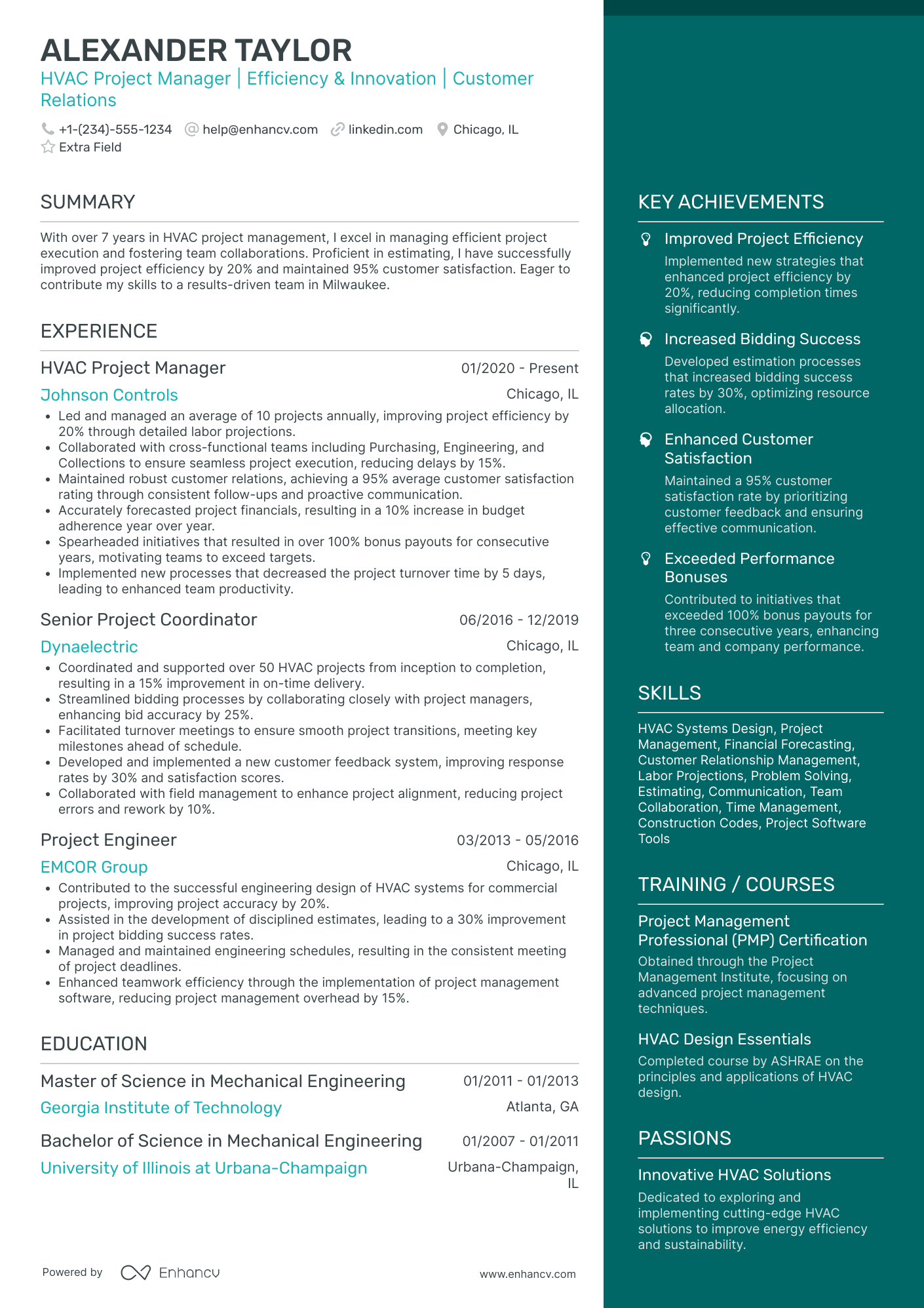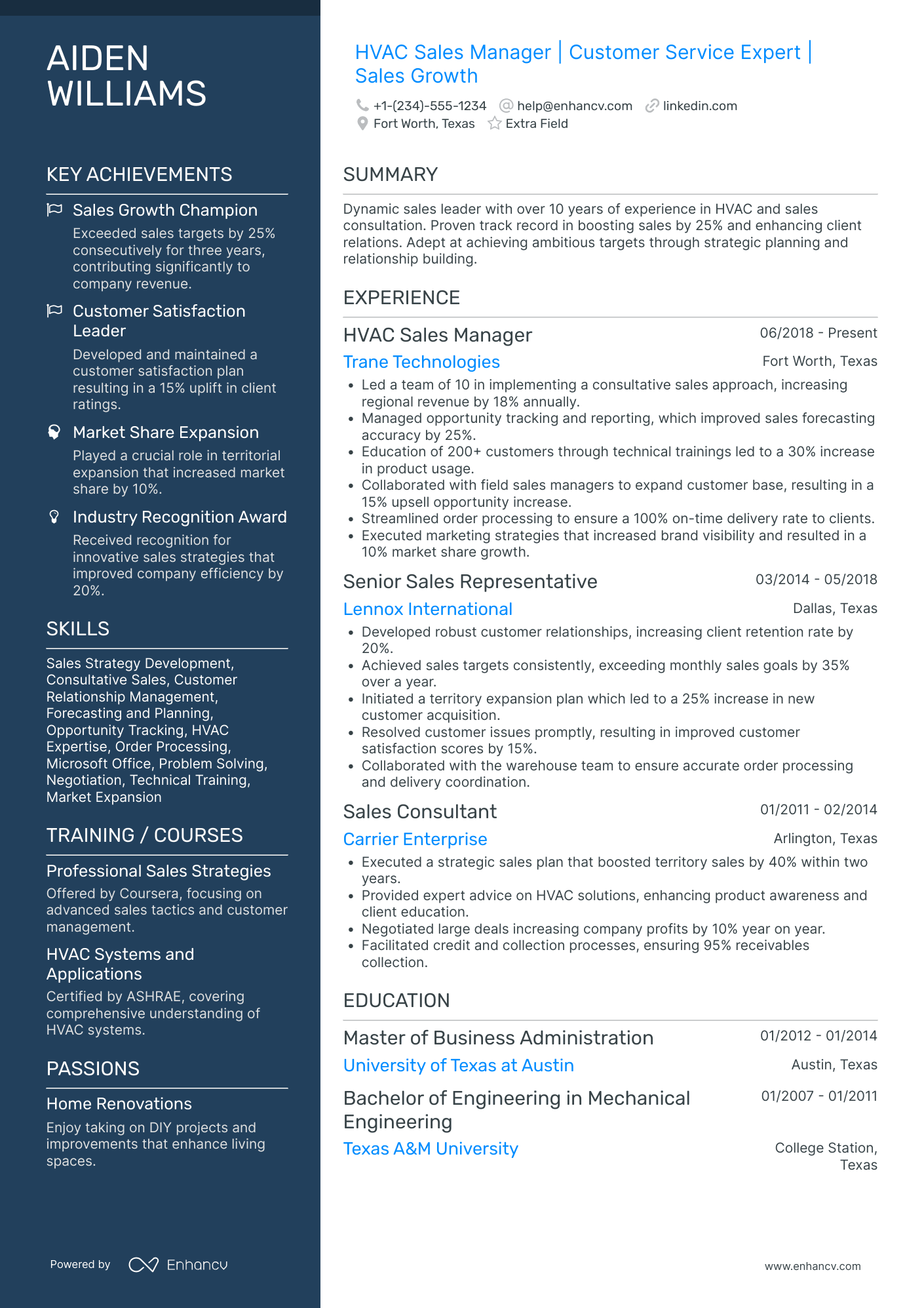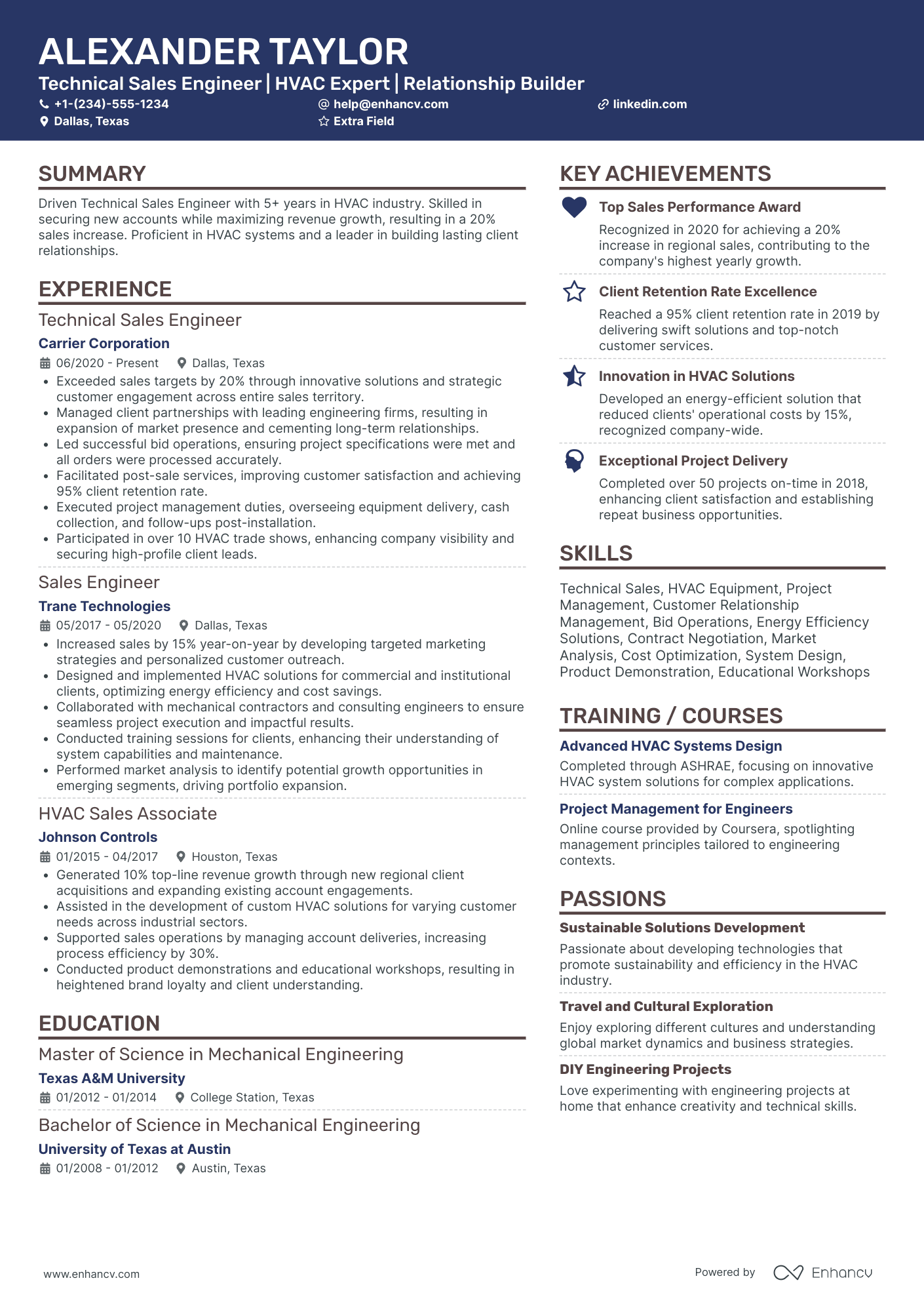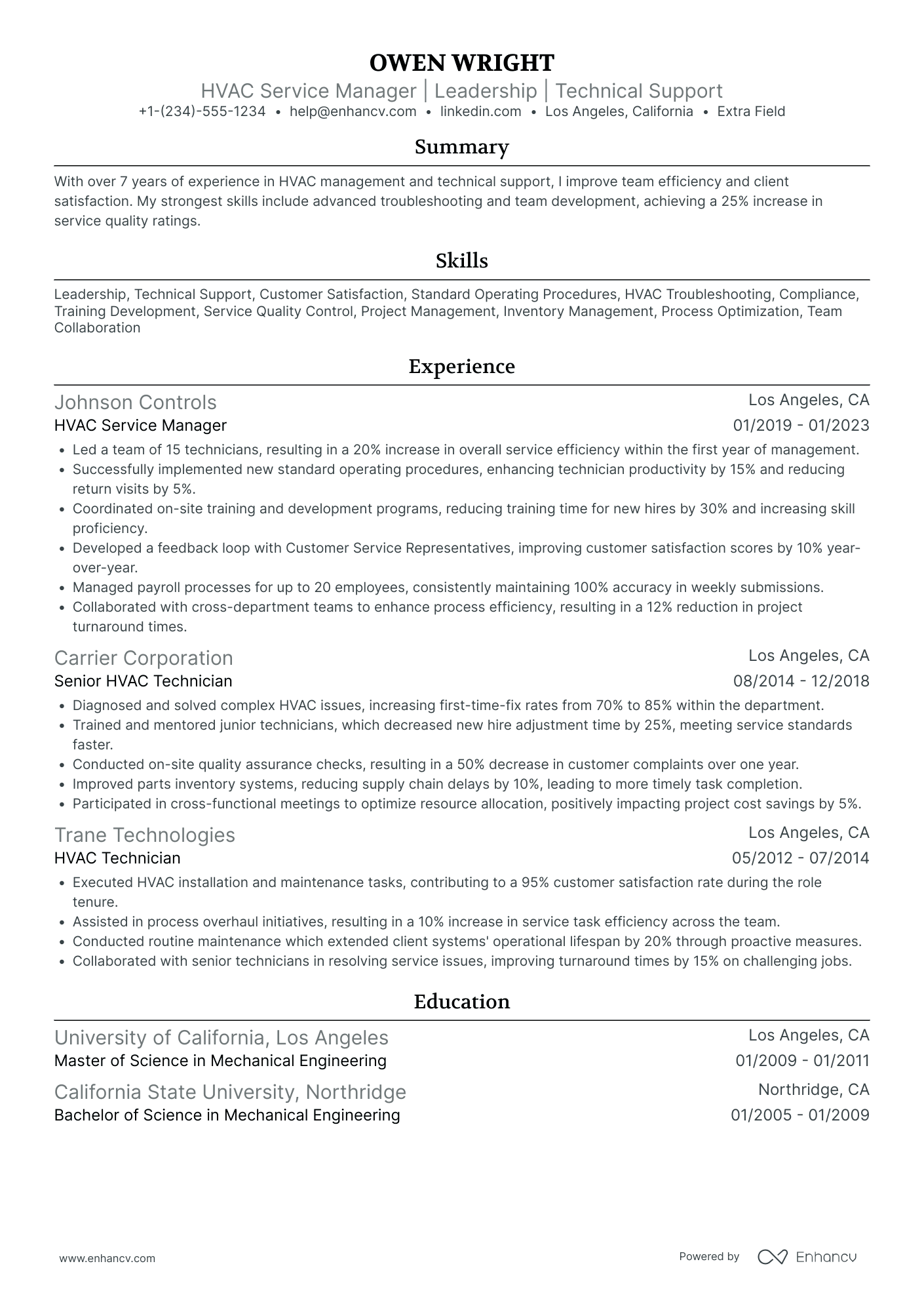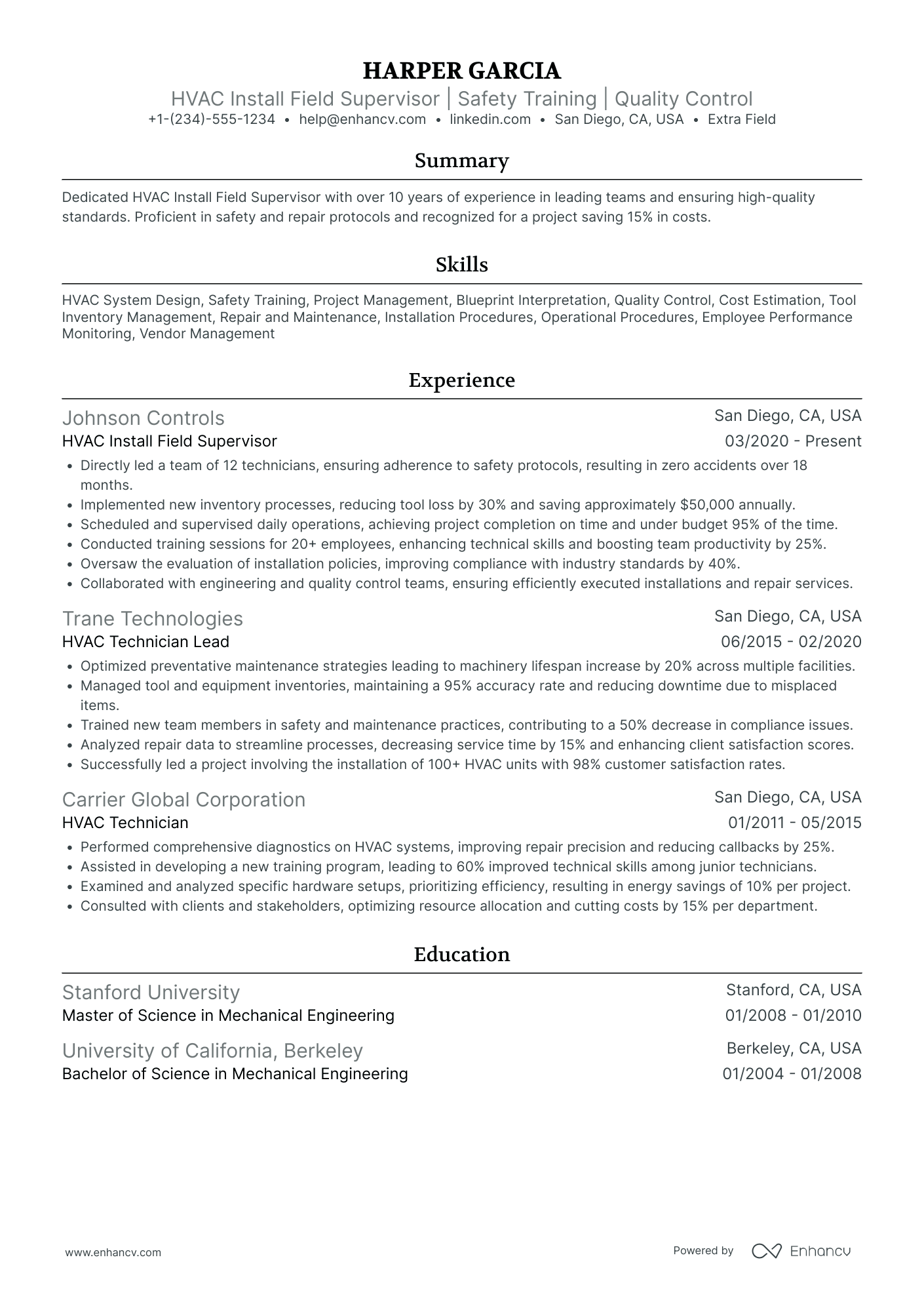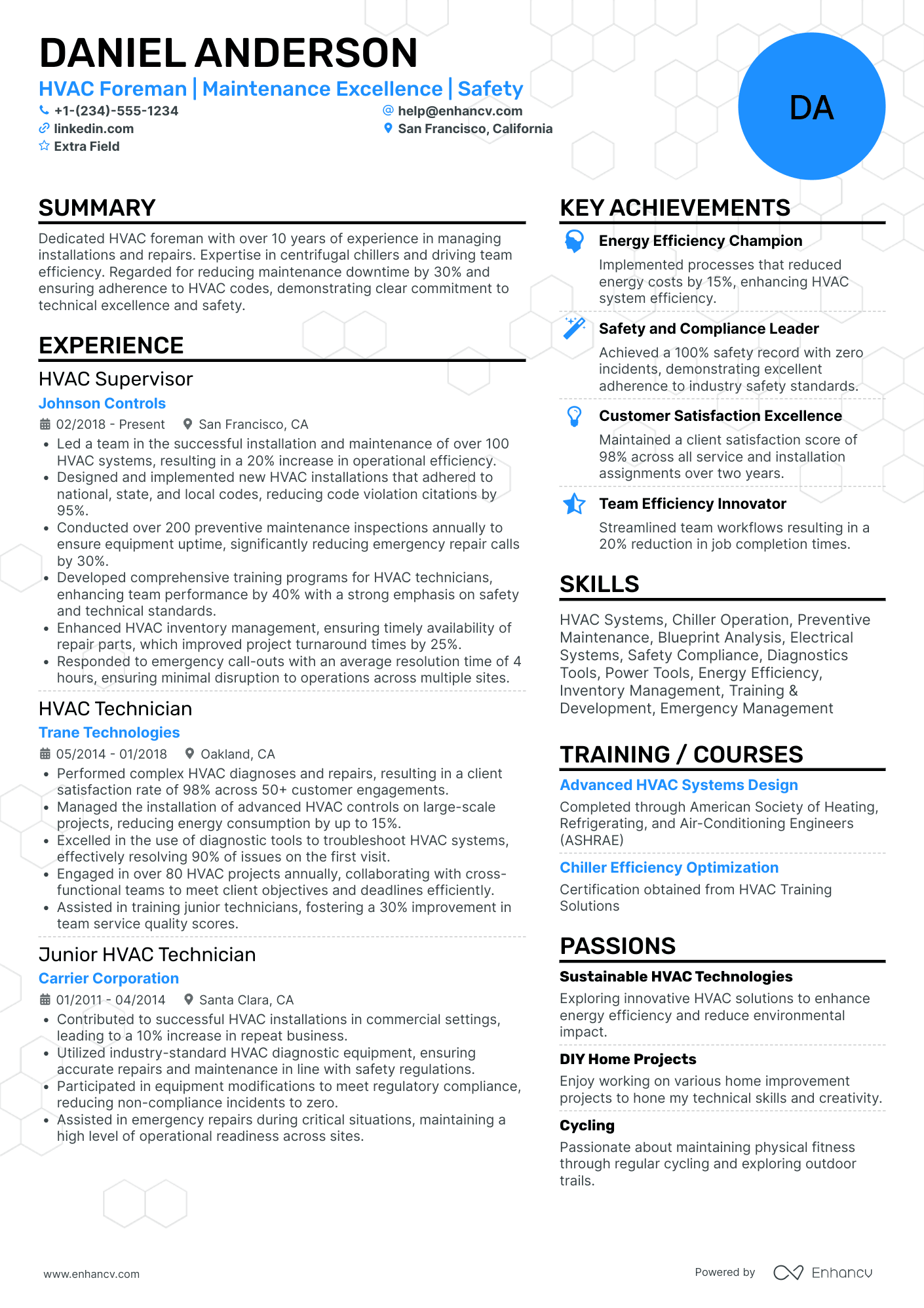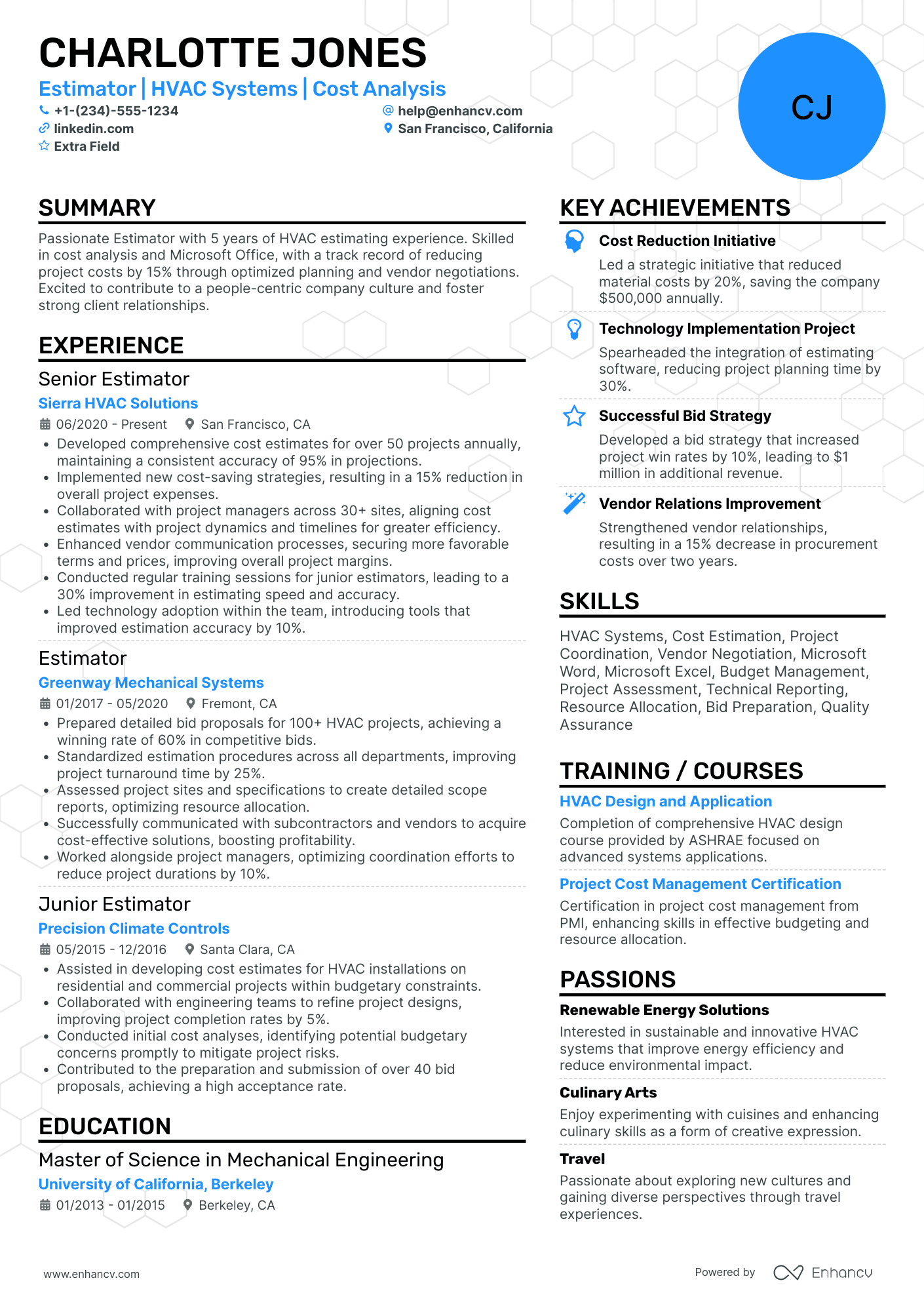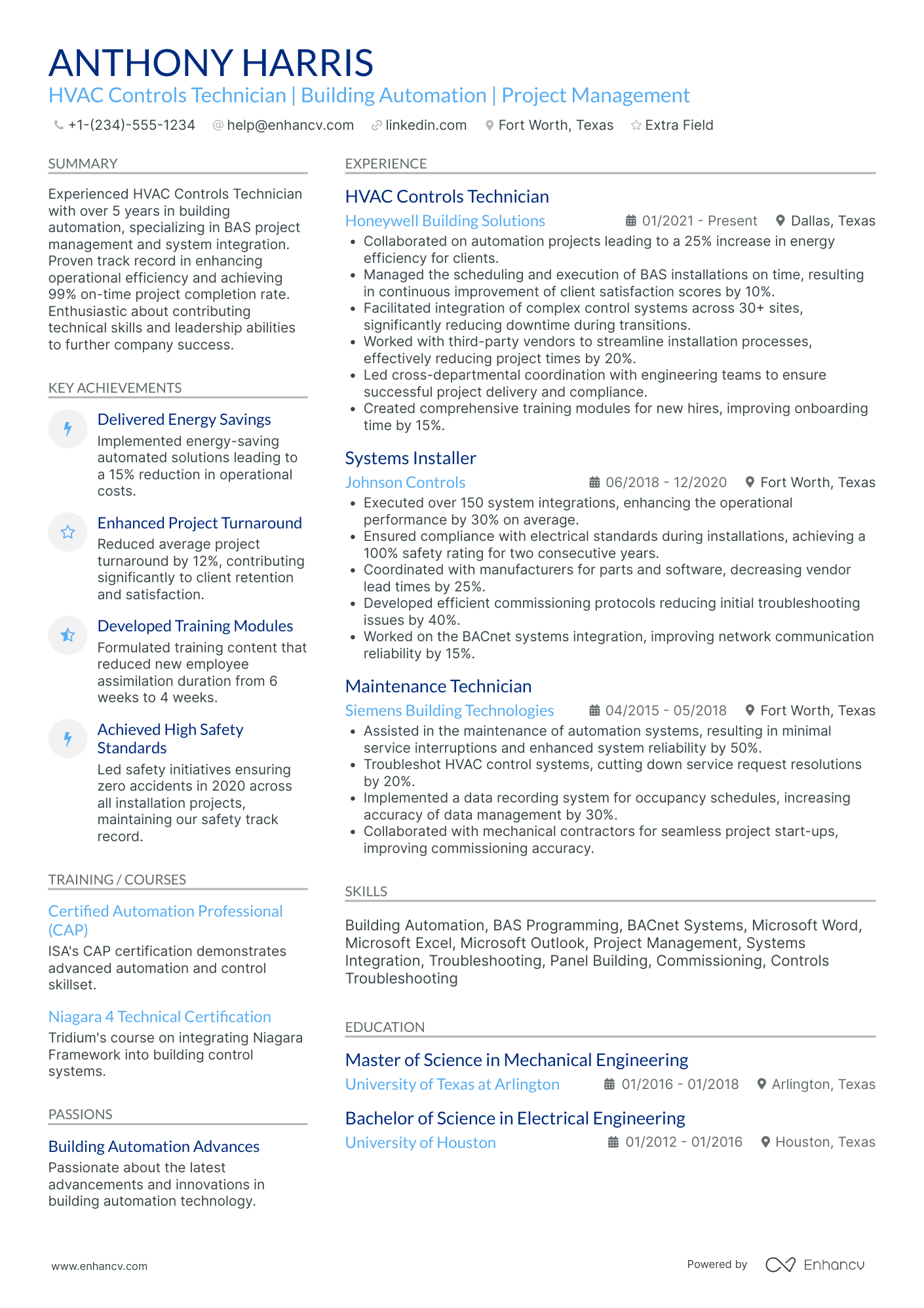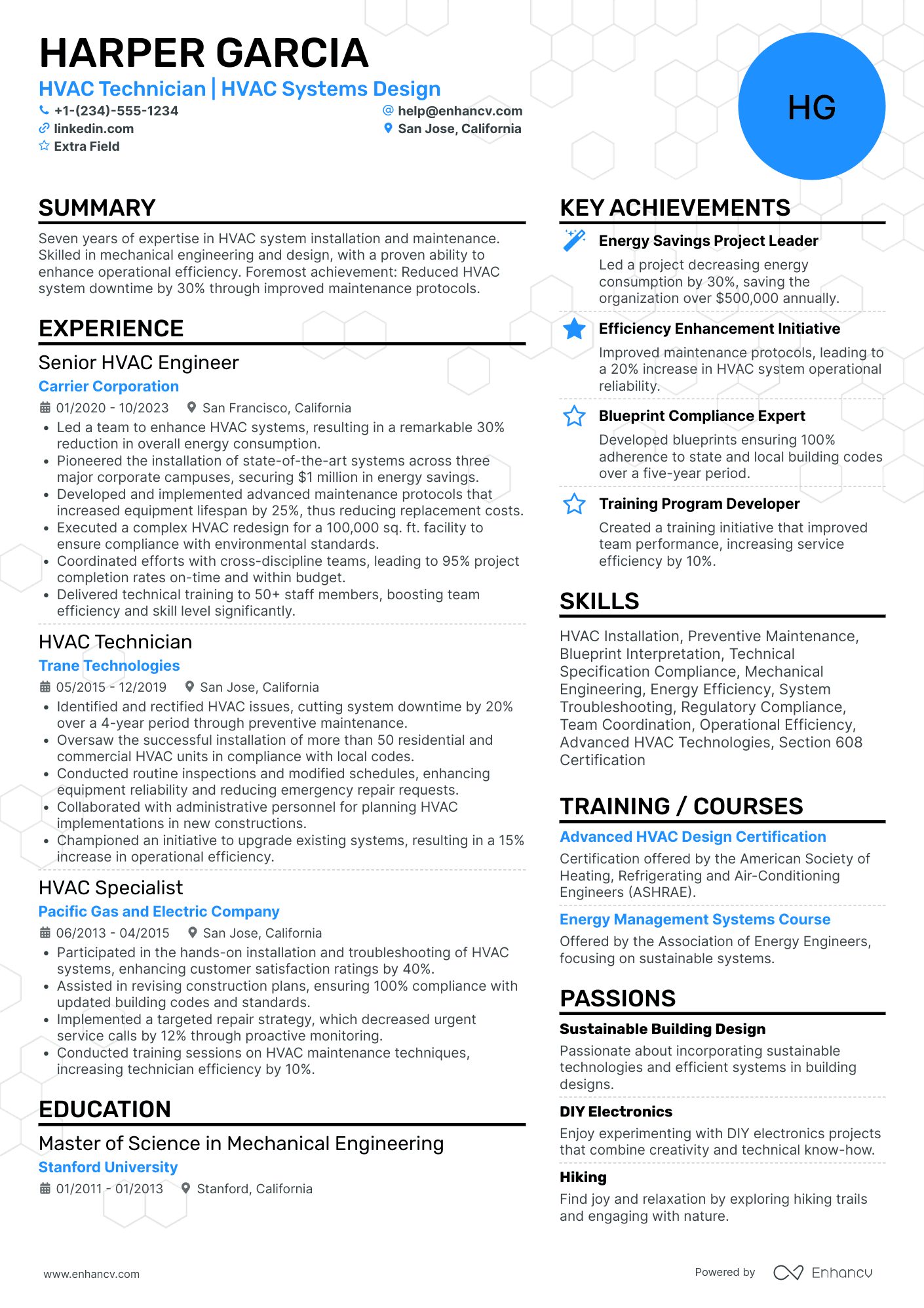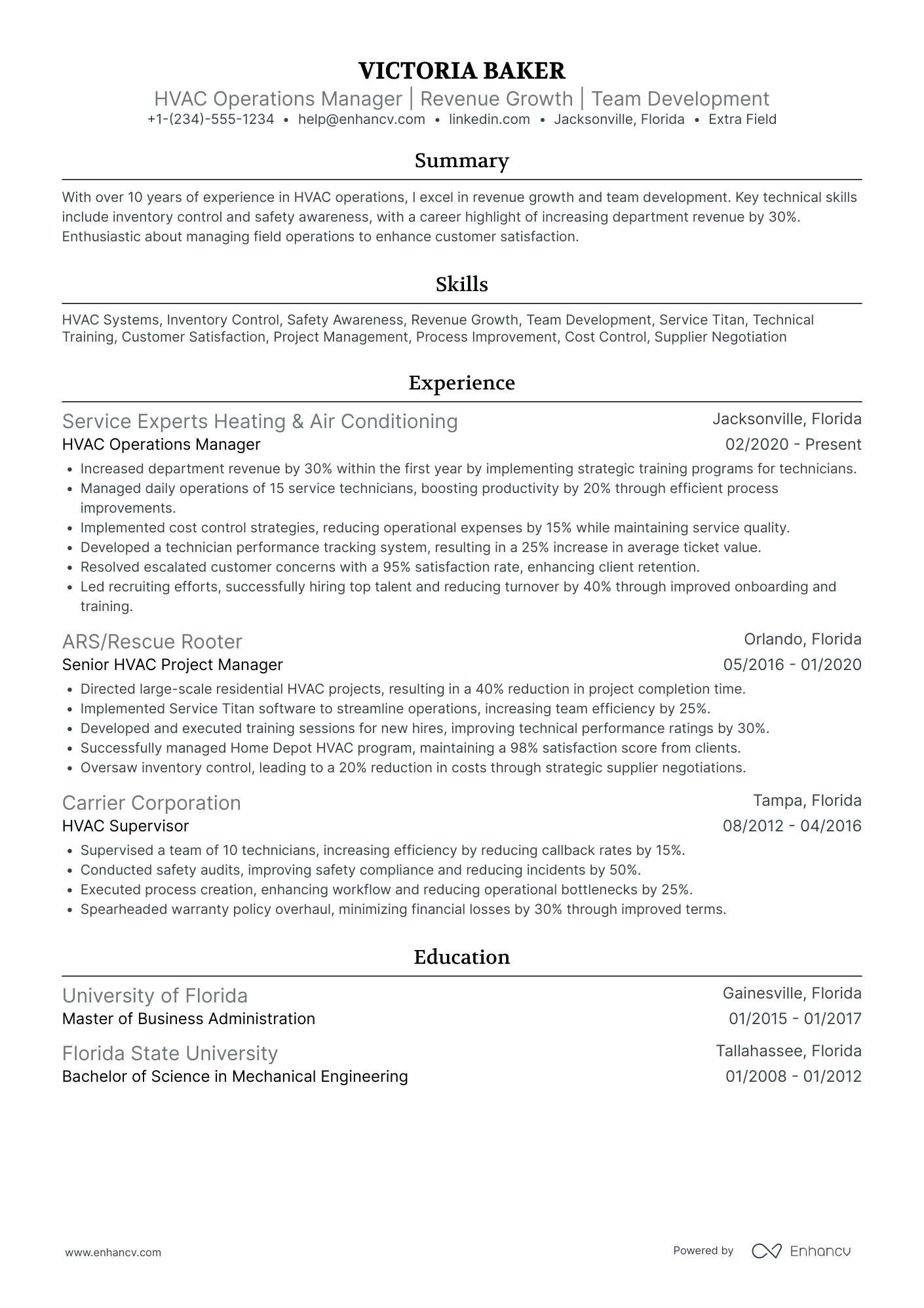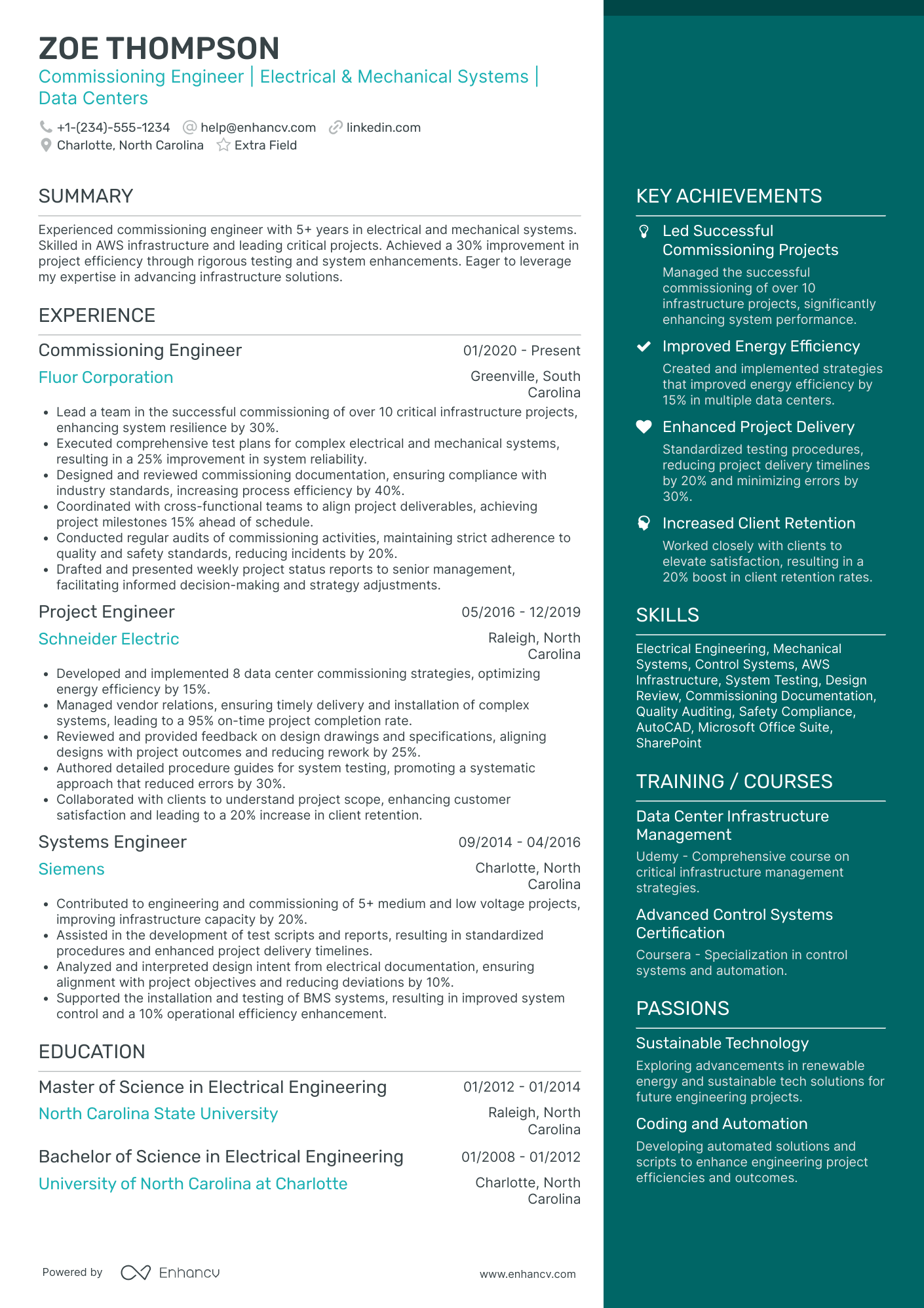Imagine this: the owner of a busy family-owned ice cream shop is frantically calling because their air conditioning system has failed on a scorching summer day. The ice cream is melting, customers are leaving, and panic sets in.
Enter you—the HVAC technician. With your expertise, you quickly diagnose the issue, fix the system, and save the day, keeping the business running smoothly. You’re the behind-the-scenes hero people don’t realize they need—until they do.
In today’s world, HVAC systems are essential, and the demand for skilled tradesmen remains high. To stand out in this competitive field, you need a well-crafted HVAC resume that highlights your technical know-how and ability to easily handle real-world emergencies.
Key takeaways
- Use reverse-chronological format to рresent recent HVAC experience and career growth.
- Keep your document clean and professional by using proper margins, a two-column layout, and subtle colors.
- Tailor your application to the job, aligning keywords and achievements with the job description for better ATS compatibility.
- List hard and soft skills separately, emphasizing both technical expertise and customer service abilities.
- Showcase certifications like EPA 608 and NATE prominently, as they're highly valued in HVAC roles.
- Quantify achievements to demonstrate your impact, like reduced downtime or cost savings.
Let’s see a solid HVAC resume example.
HVAC resume sample
Use Joseph’s resume as a template for your own or create a new one within minutes using the Enhancv resume builder.
Joseph White
HVAC Technician
(619) 555-0123 | joseph.white@enhancv.com | @LinkedIn | San Diego, California
Summary
Detail-oriented HVAC Technician with over six years of experience in installing, repairing, and maintaining air quality systems. Expert in diagnosing maintenance issues and performing emergency repairs efficiently. Known for exceptional service delivery and ability to handle multiple warranty service projects. Skilled in enhancing system efficiency and client satisfaction through proactive service and maintenance.
Experience
Senior HVAC Technician
Heating and Cooling, LTD., San Diego, California
June 2018 – Present
- Diagnose and repair complex residential and commercial HVAC systems, improving system efficiency by 20%.
- Lead technician for emergency services, recognized for reducing average repair time by 30%.
- Train junior technicians in system diagnostics, repair techniques, and customer service skills.
HVAC Technician
CoolTech HVAC Services, San Diego, California
May 2016 – May 2018
- Performed installations and preventive maintenance for HVAC systems in commercial and residential buildings.
- Conducted regular system checks and replaced parts, leading to a 25% decrease in customer complaints due to system failures.
- Managed inventory of repair supplies and equipment, ensuring the availability of necessary tools at all times.
Education
Associate of Science in HVAC Technology
San Diego Technical College, San Diego, California
Graduated: 2016
Certifications
- EPA Section 608 Technician Certification
- NATE Certified HVAC Technician
- OSHA 30-Hour Construction Safety and Health Training
Skills
- HVAC System Installation
- Troubleshooting and Diagnostics
- Preventive Maintenance
- Emergency Repair
- Customer Service
- Team Leadership
Transitioning from a sample resume blueprint to the actual resume format will refine and define your application’s structure.
How to format an HVAC resume
Choosing the right resume format for an HVAC technician is like setting a thermostat. When it’s set correctly, everything works smoothly; if not, you quickly notice something’s off. Use a resume template that presents your top skills and experience clearly!
Top sections on a resume
When outlining your resume, consider what resume sections you need to include.
Here are our suggestions:
- Summary Profile
- Core Competencies
- Work History
- Certifications and Training
- References
We’ll discuss them in more detail below.
Resume format
The reverse-chronological format works wonders for technical roles like HVAC. It showcases your work experience starting with your most recent job, ensuring hiring managers see your latest achievements first. This structure emphasizes career growth and displays your skill progression.
Resume designs
Less is more in the world of job applications, especially for technicians. Keep it to one page unless you have extensive experience that justifies a second one.
Here are some other design tips:
- Ensure your margins fall within the ideal range of 0.5”–1”. Anything smaller could make your resume hard to read. Anything larger, and your resume might look empty.
- Consider a two-column layout to maximize space and make your resume easy to scan.
- A subtle touch of color can make important sections stand out, but don’t overdo it—professionalism is key.
- Stick to clean fonts like Arial, Calibri, or Lato to legibly present your HVAC achievements.
Contact information
Your resume header is the first thing hiring managers will see, so ensure it’s accurate and clear. Include your name, job title (e.g., HVAC Technician), and contact details. Skip the photo unless the job description specifically asks for one.
You can also use a neat headline to illustrate your services, something like “Certified HVAC Technician | Expert in Installation, Repair, and Maintenance of Heating, Ventilation & Cooling Systems.” In addition to being engaging, this headline contains keywords that can improve your resume’s ATS score.
Different regions expect different formats – Canadian resumes, for example, may look unique.
PRO TIP
Contrary to popular belief, our tests showed that fonts, colors, columns, and resume length don’t affect ATS (Applicant Tracking Systems) parsing. Focus on matching job description language and formatting details like dates and bullet symbols as those may affect your application.
File formatting and naming
Always send your resume as a PDF to keep the formatting intact, unless the job ad requires something else. To ensure clarity and professionalism, name your document using this popular convention: James_Smith_HVACTechnician.pdf.
It’d be a shame to polish your resume and have a typo on it. Ensure your document is flawless, with our free resume checker!
Is your resume good enough?
Drop your resume here or choose a file. PDF & DOCX only. Max 2MB file size.
Now, let’s focus on showcasing your HVAC expertise.
How to write your HVAC resume experience
Incorporating your experience as an HVAC technician into your professional history section is crucial for presenting a well-rounded skill set.
For example, your ability to troubleshoot complex mechanical issues and work with a variety of tools and technologies shows your technical expertise. At the same time, emphasizing how you balance these technical complexities with customer service demands illustrates your communication and interpersonal skills.
Your experience working in challenging environments, while adhering to industry regulations, proves your resilience and professionalism. By integrating these aspects, you create a comprehensive picture of your capabilities, which is essential for standing out to potential employers or clients.
Here are some concrete tips on how to approach the HVAC experience section:
- Start with your most recent position and include your job title, company name, and employment dates.
- List your core responsibilities, using action verbs and quantifiable results where possible.
- Spotlight specific accomplishments or challenges you overcame, such as reducing energy costs or handling high volumes of work.
- Mention any specialized tools, software, or equipment you’re experienced with, such as refrigerant recovery tools or diagnostic equipment.
Let’s look at a real HVAC job posting. The highlighted bits are the ones we’ll target in the following sample experience entry.
HVAC Technician
Position Overview
At Marriott Vacations Worldwide (MVW), we make vacation dreams come true for travelers around the world in a supportive, friendly, and beautiful work environment. As a Maintenance Technician III at MVW, you will assist in providing our Owners/guests with experiences and events to make memorable vacation memories, where meaningful moments are made together.
Requirements
As a Maintenance Technician III, a typical day will include:
- Responding and attending to guest repair requests.
- Performing preventive maintenance tasksas assigned.
- Communicating with guests/owners to resolve maintenance issues.
- Displaying above-average engineering operations skills and strong general mechanical ability.
- Performing general engineering-related inventory duties.
- Performing advanced troubleshooting of building systems.
- Reading, logging, tracking, and interpreting readings from meters, gauges, and other measuring devices.
- Participating in regular training for safety, technical knowledge, and career development as applicable.
Guest Experience and Company Standards
- Welcoming and greeting guests and anticipating and addressing their needs.
- Interacting with colleagues and guests professionally and promptly.
- Contribute to team goals.
- Always following company policies and safety procedures.
To Become a Maintenance Technician III at MVW
- Available to work various shifts, holidays, and weekend days.
- Reach overhead and below the knees, perform bending, twisting, pulling, and stooping, and be able to stand, sit, or walk for an extended period of time.
- Lift/Carry/Push/Pull Items that Weigh up to 50 lbs without assistance.
- The position may require background and drug screening contingent on company policy in accordance with applicable legal requirements.
Tailoring your HVAC technician resume
Tailoring your resume to the job description can make the difference between getting noticed by a recruiter and being overlooked.
Here’s why it’s important:
- Customizing your experience to match the specific requirements in the job description shows that you’re the right fit for the role.
- Tailoring demonstrates your attention to detail, a skill highly valued in HVAC roles, where precision is critical.
- By using the same language and keywords from the job description, you improve the chances of your resume getting through the applicant tracking systems.
- It ensures you’re showcasing the skills the hiring company is most interested in, which increases your chance of an interview.
Here’s an experience section targeting the job posting above:
- •Completed 95% of guest repair requests within 24 hours, enhancing guest satisfaction scores by 15%.
- •Performed preventive maintenance on HVAC systems, reducing equipment downtime by 30%.
- •Effectively communicated with over 300 guests/Owners annually to resolve maintenance issues, maintaining a 4.8/5 satisfaction rating.
- •Led a team to implement a new inventory tracking system, reducing inventory discrepancies by 25%.
- •Troubleshot and repaired complex building systems, decreasing external contractor costs by 20%.
- •Participated in 100+ hours of technical and safety training, contributing to zero safety incidents in a 3-year period.
Here’s what makes it effective:
- Highlights a reduction in equipment downtime, aligning with the job requirement for performing preventive maintenance tasks.
- Shows a strong track record in communicating with guests/owners, directly linking to resolving maintenance issues.
- Proves troubleshooting of complex building systems, reflecting advanced skills required by the position.
- Emphasizes participation in training and safety practices, which aligns with the job's emphasis on regular safety and technical training.
Knowing the tools is one thing, measuring their impact is another—let’s quantify your experience for a stronger impression.
How to quantify your experience on a resume
Quantifiable achievements on an HVAC resume are important because they demonstrate your proven impact and build credibility with measurable results.
By providing concrete numbers, you differentiate yourself from other candidates who may only list responsibilities. Plus, this makes it easier for hiring managers to assess your capabilities quickly and envision your contributions.
Here are some ideas on how to approach this:
- Include the number of successful HVAC installations you have completed to provide measurable proof of your effectiveness and proficiency.
- Highlight the percentage reduction in repair callbacks achieved in previous roles to showcase your attention to detail and the quality of your work.
- Specify the number of preventive maintenance tasks executed to reflect your commitment to system efficiency and longevity.
- Detail the volume of emergency repair situations handled to underline your ability to respond swiftly and effectively to urgent service requests.
- Mention measurable achievements related to energy efficiency, such as the percentage reduction in power usage after system upgrades or tune-ups, to emphasize your value in delivering cost-effective solutions.
Even without much experience, we can engineer your skills to support your resume effectively.
How do i write an HVAC resume with no experience?
Having no experience can be a challenge in finding an HVAC job, as you need very specific technical knowledge. The key is to show recruiters that you’re eager to learn and can quickly become an asset.
A great way to build expertise is through an apprenticeship, where you’ll gain hands-on training and grow from there.
Here’s how to structure your application to stand out as an attractive candidate:
- State your goals and enthusiasm for hands-on HVAC experience, emphasizing your eagerness to learn and grow.
- Draw attention to your physical ability to lift heavy equipment and work in various weather conditions (if that’s the case).
- Show your quick learning ability, especially in troubleshooting systems or using HVAC tools/software.
- Mention basic knowledge of refrigeration, heating systems, or mechanical skills to demonstrate a strong foundation.
- Include transferable skills like problem-solving, attention to detail, and experience with tools.
- Emphasize your customer service skills, such as effective communication and handling inquiries.
- Note any teamwork experience, as HVAC work often involves collaboration on projects.
- Use a functional or hybrid resume format to focus on skills and training over work history.
Finally, pair your application with a strong resume objective. This concise statement—up to three sentences—at the top of your document outlines your career goals and articulates why you can achieve them in that specific company.
Here’s a good example:
Moving from the drafting table to the field, let’s equip you with the necessary hard and soft skills for the job market.
HVAC skills on your resume
Your HVAC skills section allows employers to quickly gauge whether you have the technical expertise and interpersonal abilities needed for the role. In HVAC work, you need to demonstrate both your capacity to handle the technical challenges of the job and your ability to interact professionally with clients and team members.
Hard skills refer to the specific, practical abilities that are essential for HVAC work. These are acquired through training, certifications, or hands-on experience and are directly related to the job. It's best if you outline them in a separate section, so they’re easy to see.
Here are some examples:
Best hard skills for your HVAC resume
- Air conditioning units
- Furnaces
- Heat pumps
- Central heating systems
- Ductless mini-split systems
- Packaged heating and air systems
- Boilers
- Chimneys
- Programmable Thermostats
- Energy management systems
- Indoor air quality equipment
- HVAC control systems
- Ventilation equipment
- Air handlers
- Radiant heating systems
- Geothermal heating and cooling systems
- Variable refrigerant flow (VRF) systems
- Evaporative coolers
- Solar air conditioning systems
- Ductwork and venting systems
Soft skills, on the other hand, are personal and interpersonal attributes that complement your technical know-how. These skills enable you to interact well with clients, handle customer service inquiries, and collaborate with coworkers efficiently. They’re most comprehensible when illustrated with specific examples in your experience section.
Take a look at our list:
Best soft skills for your HVAC resume
- Problem-solving skills
- Customer service skills
- Communication skills
- Time management skills
- Detail-oriented
- Ability to work under pressure
- Physical stamina and strength
- Technical abilities
- Ability to interpret blueprints and specifications
- Flexibility
- Teamwork and collaboration skills
- Organizational skills
- Self-motivation
- Dependability
- Patience
- Mechanical aptitude
- Ability to learn new technologies
- Critical thinking skills
- Respect for safety guidelines and standards
- Troubleshooting technical issues
PRO TIP
Another effective strategy for hands-on positions is incorporating a “Core Competencies” section. It provides a clear, organized way to display your key skills, abilities, and knowledge, typically positioned just below the header for easy visibility. You can put both hard and soft skills there.
After tooling up with skills, it’s time to elevate the structure with your educational and certification credentials in mind.
How to list your certifications and education on your resume
The education section of your resume can leverage your application, especially when you don’t have sufficient direct experience. In this component, you can show your formal training, relevant certifications, and additional training that make you a strong candidate for the job.
HVAC trade school
An HVAC diploma is typically earned through a trade school program lasting 6 months to 2 years. These programs combine classroom learning with hands-on training, covering system installation, maintenance, and electrical work, thereby preparing graduates for entry-level roles.
Certifications for an HVAC resume
For HVAC and maintenance technician roles, certifications and specialized training might carry more weight than a traditional degree, even if your major is relevant, like “Construction Management.” So demonstrating up-to-date certifications can better prove you’re staying current with industry standards and responding to employers’ needs for practical skills.
Here’s how you can approach listing your certifications or additional training:
- Create a “Certifications” section for multiple certifications.
- Mention key certifications in your resume summary for visibility.
- Add certifications under “Education” if earned through academic programs.
- Include certifications in progress with expected completion dates.
Best certifications for your HVAC resume
Let’s look at a well-written education section that combines both an HVAC diploma and relevant certifications.
- •Completed coursework in HVAC system installation, maintenance, and electrical work.
- •Gained hands-on training in preventive maintenance, system troubleshooting, and safety protocols.
- •Certified for safe handling and disposal of refrigerants in HVAC systems.
- •Trained in essential workplace safety and health practices for construction environments.
It works because it:
- Includes key certifications directly aligning with job requirements.
- Highlights hands-on experience in system installation, troubleshooting, and preventive maintenance.
- Combines real institutions with a mix of formal education and certifications, showing continuous professional development.
It’s time to cap your resume with a summary that offers a panoramic view of your potential.
How to write your HVAC resume summary
A resume summary for an HVAC role should quickly convey your experience, key skills, and achievements. Use three to five sentences to describe what you bring to the table. Remember, the summary might be the only part of your resume that gets thoroughly read, so spend enough time polishing it.
This summary is effective because it underscores key skills and achievements, such as troubleshooting, preventive maintenance, and guest communication, while also quantifying successes like repair request completion and equipment downtime reduction.
As a final touch, let’s enhance your resume’s blueprint with additional sections that reflect your unique professional landscape.
Optimize your resume summary and objective for ATS
Drop your resume here or choose a file.
PDF & DOCX only. Max 2MB file size.
Additional sections for an HVAC resume
Optional sections give color to your resume and set you apart from other candidates. For an HVAC job, these additions could emphasize what you do in your free time and what you do to give back to your community.
Here are some ideas:
- Show off specific projects, such as HVAC installations or major repairs, where you improved system efficiency or reduced operational costs.
- Mention any advanced technical or safety training courses, reflecting your commitment to keeping up with industry standards.
- List any additional languages you speak, especially if you’re applying for roles in environments with a diverse customer base.
- Include any volunteer work where you used your HVAC skills or contributed to the community, which demonstrates your initiative, leadership, and willingness to help others.
- References can be a separate part of your resume, available on demand. Show future employers your clients are satisfied with your service.
Possible reference section:
In conclusion
An effective HVAC resume should function like a well-maintained unit—precise, efficient, and tailored to the job. Highlight your skills, certifications, and measurable results to ensure your career stays cool under pressure.
HVAC resume examples
By Experience
By Role
